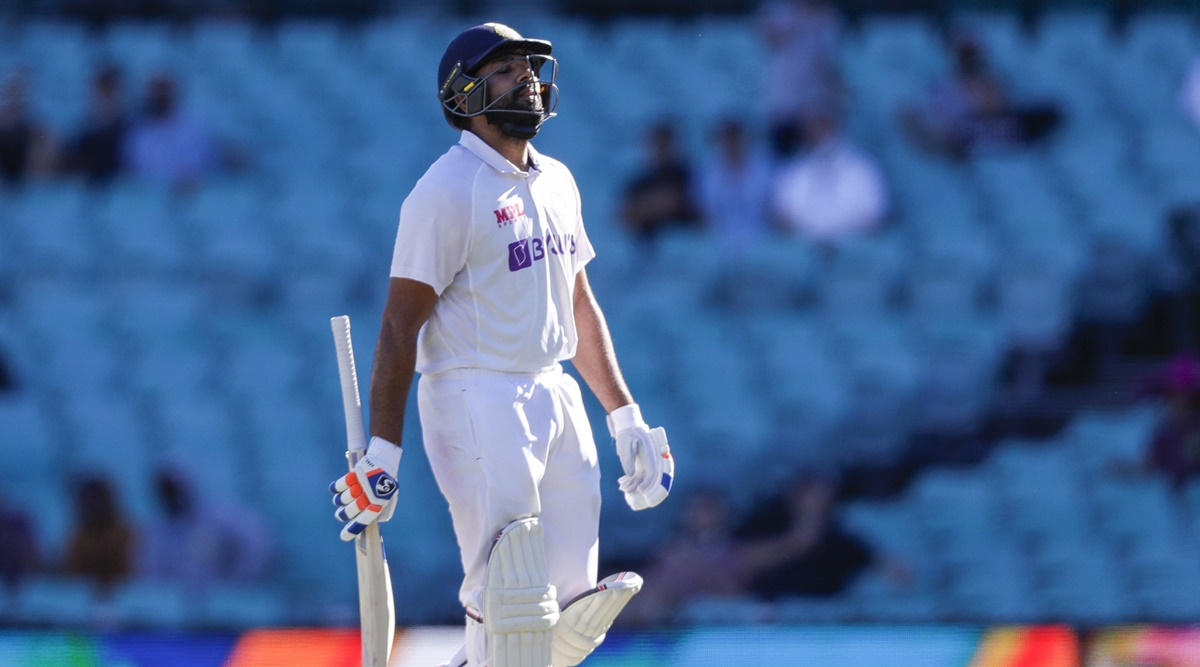Rohit looked in total control in the second innings, before a moment of indiscretion brought about his downfall.
Less than 15 minutes and three overs before stumps, Rohit Sharma let his instinct conquer his reasoning. He wheeled away a pull shot into the deep shadows on his leg-side, where pounced Mitchell Starc, seemingly out of nowhere, to complete a catch, sliding on his knees, to end the Indian opener’s most fluent outing outside Asia till date. The late wicket pushed India to 98/2 at stumps, after Australia had set them a daunting 407 for a victory.
It was a cruel end to a knock that promised so much more. Sharma was in utter control from the moment he strode out. His discretion and judgement stood out; there were no fringes of extravagance or indulgence, nothing outrageous or out of the world, nothing that troubled him even fleetingly. But in the middle of this dreamy knock, kicked in momentary misjudgement, or a split-second streak of carelessness. When instinct overpowered acquired wisdom without any apparent tussle.
The pull is to Rohit Sharma what a forehand chip is to Roger Federer. He could play the stroke with his eyes blindfolded or legs bound in chains. Pat Cummins’ short ball paused in the air after landing on middle and leg as if imploring Sharma to pull it into the shadows in the fine-leg region. Sharma swayed his body a trifle, got under the ball and swivelled. Everything about the stroke was precise, except for the placement.
Sharma gave a disbelieving stare. When he walked back to the pavilion, he would have replayed that shot several times in his head and cursed and cussed himself. At the untimeliness of the stroke, at the imprecision of the shot, at the sheer consequence of the stroke, or at the inconsequence of that delivery. He had time to duck, space to leave, or he could have glided it finer, as he often does, he could have rolled his wrists over it and kept it along the ground. He could have done anything but flay it straight into the hands of the fielder. An opportunity to ascertain his overseas credentials slipped through his hands.
It was not the first time though that his favourite stroke has forsaken him in a crucial hour of his career or a match. Memory rolls back to the morning of the Centurion Test three years ago, when he was batting fluidly on 47, chasing 287, and attempted to hook Kagiso Rabada and ended up lobbing a catch to AB de Villiers at fine-leg. At least, he could console himself thinking that Rabada had hurried him a bit and de Villiers took a sliding catch, running nearly 20 yards. But here he had only himself to blame. For the Cummins’ delivery had little zip or zing, and Starc had to make only a couple of steps. It was neither a loose ball, nor a loose shot. It was just the wrong shot at the wrong time. In that sense, Sharma’s departure seemed predestined.
Such fleeting moments of indiscretion define his overseas career. He could rattle out quite a few such instances. The return catch to Nathan Lyon in Adelaide 2014. The attempted slash off Shane Watson in Brisbane, the under-edged sweep in Sydney, or the most hideous of all, the heave off Lyon, intended to plunge into the Torrens river outside the Adelaide Oval but nestled in the hands of mid-wicket, in 2018.
Those were moments when Sharma could have stamped his undisputed quality on matches, stabilised his role in the side, and silenced the cynics. Yet, those knocks ended up as case studies of self-inflicted doom. There is something inherently tragic about a batsman consistently defeating himself, when his own instincts conspire his downfall. There is no allure to failure.
Yet, Sunday at the Sydney Cricket Ground was another moment when it seemed that no one else but Sharma could defeat Sharma. For he was utterly untroubled in his 92-ball sojourn. He, or his opening partner Shubman Gill, was undaunted by the monstrous score Australia had set them to chase, striking a fine balance between attack and defence. Sharma had lot of time to hang back at the crease and defend. His footwork was precise, hands soft, and he did not reach out for the balls in the corridor. The bounce was variable, so he ditched his staple on-the-rise drives, and instead leant into fuller deliveries. Starc was treated to a brace of gorgeous cover drives in an over. The first was a half-volley outside off-stump, which he just coaxed through the covers. For the next, his front-foot glided out, before his hands just brush-stroked it through extra cover. In the next over, Sharma emphatically pulled Cameron Green for a six. The brutal and the graceful, in the space of seven balls.
Gill’s departure saw Sharma embrace a more defensive approach. Apart from the flicked four off Lyon that ushered in his half-century, he kept risks aloof. He seemed inclined to bat out the day and had he managed it, India would have sparked faint hopes of a fourth-innings heist. But that was not to be, as his instinct conquered his reasoning.
Source: Read Full Article


